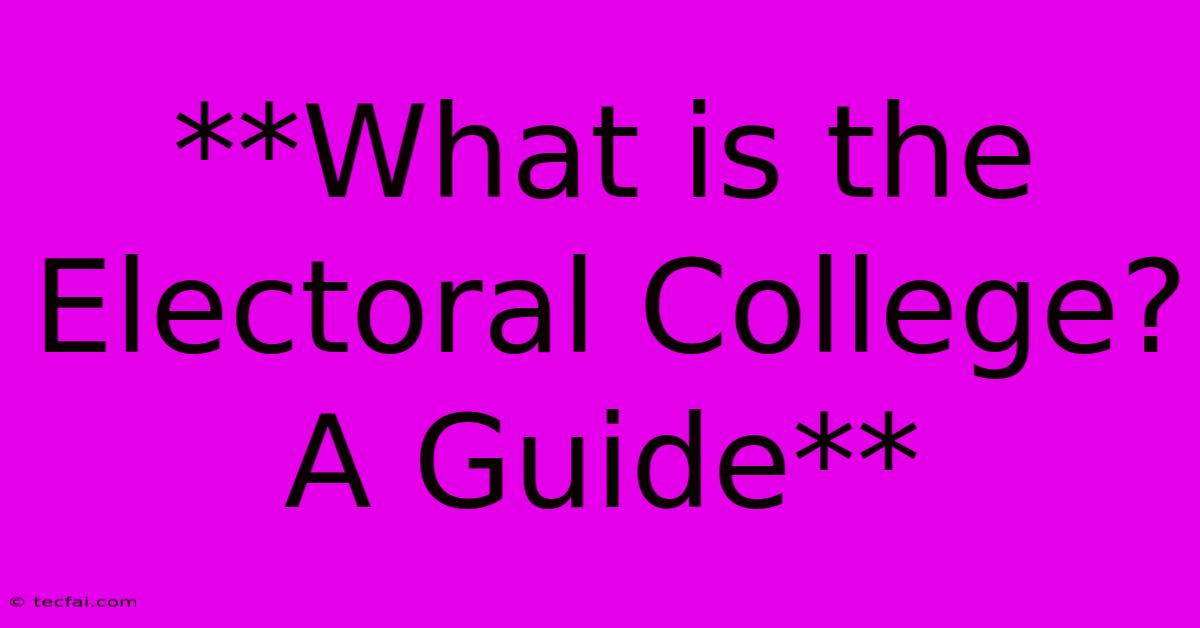**What Is The Electoral College? A Guide**

Discover more detailed and exciting information on our website. Click the link below to start your adventure: Visit Best Website tecfai.com. Don't miss out!
Table of Contents
What is the Electoral College? A Guide
The Electoral College is a unique and often misunderstood aspect of the United States presidential election process. It's a system designed to select the President and Vice President of the United States, and while it has been a part of American history since the nation's founding, it continues to spark debate and controversy. This guide will explain the basics of the Electoral College, how it works, and some of the key arguments surrounding it.
The Electoral College: How it Works
The Electoral College is not a physical location but rather a process. It's a system where each state, along with the District of Columbia, is assigned a certain number of electors based on its population. The total number of electors is 538, and a candidate needs to secure at least 270 electoral votes to win the presidency.
Here's a breakdown of the process:
- Presidential Election: Every four years, citizens vote for the presidential candidate they prefer. This is known as the "popular vote."
- Electoral Vote Allocation: Each state's electoral votes are allocated based on its congressional representation, which includes both Senators and Representatives. For instance, California has 55 electoral votes because it has 2 Senators and 53 Representatives in the House of Representatives.
- Winner-Take-All System: In most states, the candidate who receives the most popular votes in that state wins all of the state's electoral votes. This is known as the "winner-take-all" system. However, Maine and Nebraska utilize a different system, awarding electoral votes proportionally.
- Electoral College Vote: Once the votes are tallied in each state, the electors (chosen by each state's political parties) cast their votes for President and Vice President.
- Electoral College Tally: The electoral votes are counted by Congress, and the candidate with at least 270 electoral votes wins the presidency.
The Pros and Cons of the Electoral College
The Electoral College system has been a topic of intense debate for years. Here are some of the major arguments for and against it:
Arguments in favor of the Electoral College:
- Preserves the balance of power: Proponents argue that it ensures that smaller states have a voice in the election and prevents the election from being dominated by large, populous states.
- Encourages national campaigns: Candidates need to campaign across the country, not just in densely populated areas, to appeal to a broader range of voters.
- Prevents a candidate from winning solely based on a few large cities: The system ensures that candidates need to secure votes in different regions of the country to win, promoting a more balanced representation of interests.
Arguments against the Electoral College:
- Undermines the concept of "one person, one vote": Critics argue that it gives disproportionate weight to votes in certain states, potentially leading to a candidate winning the presidency despite losing the popular vote.
- Can result in a candidate winning without a majority of the popular vote: This has happened five times in U.S. history, most recently in 2016.
- Reduces voter turnout in states deemed "safe" for one party: In states where one party consistently wins, voter turnout tends to be lower since the outcome seems predetermined.
The Future of the Electoral College
The debate surrounding the Electoral College is likely to continue. There are proposals for reform, including:
- National Popular Vote Interstate Compact (NPVIC): This agreement among states aims to award all of their electoral votes to the candidate who wins the national popular vote.
- Proportional allocation of electoral votes: This would involve awarding electoral votes based on the proportion of the popular vote received by each candidate in a state.
- Abolition of the Electoral College: Some advocate for completely eliminating the Electoral College and electing the President directly through the national popular vote.
The Electoral College, as a complex and unique aspect of American democracy, continues to generate heated discussions. It remains to be seen whether this system will be reformed or ultimately replaced in the future.

Thank you for visiting our website wich cover about **What Is The Electoral College? A Guide**. We hope the information provided has been useful to you. Feel free to contact us if you have any questions or need further assistance. See you next time and dont miss to bookmark.
Featured Posts
-
Embiid Altercation Highlights Sports Journalism Needs
Nov 06, 2024
-
Al Ahly To Zamalek Transfer Latest Updates
Nov 06, 2024
-
Kist And Merkx Qualify For 2023 World Darts Championship
Nov 06, 2024
-
Catch Up Todays Morning Headlines
Nov 06, 2024
-
Suv Ni Gatchalian Lalabag Ba Sa Batas
Nov 06, 2024
